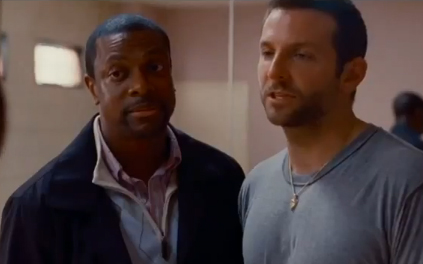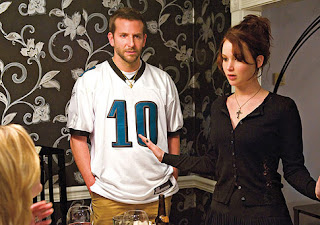philosoraptor42 (![[personal profile]](https://www.dreamwidth.org/img/silk/identity/user.png) philosoraptor42) wrote2013-10-02 06:52 pm
philosoraptor42) wrote2013-10-02 06:52 pm
Entry tags:
"Silver Linings Playbook" Has Powerful Performances All Round, But Is A Cheesy Chick-Flick At Heart

Silver Linings Playbook (2012)
I'll admit it, nothing about the promotional material for this made it look terribly appealing. I was about as likely to watch this as "House At The End Of The Street". Heck, at least the latter was a horror movie, even if every single critic hated it. Why do I mention those two titles together? Well, they both star Jennifer Lawrence and that is my main reason for taking an interest.
Naturally the director is also a draw here. I haven't seen much by David O. Russell, but I DID really love "The Fighter" the other year. And I seem to have fond memories of "Three Kings" from way back when.
I'd love to say that all my reservations were misplaced and that this blew me away, but I cannot say that. There was a lot to like here, but the film was in dangerous "Dramedy" territory here...

Here's the problem with the trend of indie 'dramadies'. 'Dramedy' is term that has come to be used of movies that seem like they are supposed to be comedies in some ways and seem like they are supposed to be dramas in other ways. When judged as a comedy, the argument can be made that they aren't funny enough. But the real death knell, to my mind, is if you can then say that as a drama they aren't dramatic enough.
It seems to me that 'dramedy' is, for the most part, an excuse for bland mediocre indie movies that have a airy-fairy comic tone to them and yet don't really include much that is likely to make you laugh. Making a clear balance between comedy and a darker tone can make for some pretty amazing films, but not every director can do what the Coen Brothers do.

"Silver Linings Playbook" didn't make it entirely clear whether it was intending to be a comedy or not, but there were definitely funny moments. Moments which worked. And I must say that I was very pleased with the (basically cameo) appearances of Chris Tucker. But before I explain Chris Tucker's role, I probably need to explain the premise of this film.
Bradley Cooper plays a man who is being released from psychiatric care. He split up with his wife, refused to honour her court order preventing him from seeing her and was sent away for treatment as a result. Chris Tucker is a friend he makes in the institution and there's a regular gag where Chris Tucker will turn up, give an obscurant technical explanation as to why the authorities had to let him go and, in many (or possibly all) cases, turn out to be an escapee.

Some friends have Bradley Cooper's character over for dinner in a blatant attempt to set him up with Jennifer Lawrence's character. Both of them have clear psychiatric issues which make them anti-social. So anti-social in fact that they don't even actually get to the meal.
Jennifer Lawrence encourages Bradley Cooper to help her win a dance competition as a means to do something constructive and, she argues, to therefore impress his estranged wife. She also promises to pass on letters from Cooper to his wife secretly, thus allowing him some indirect communication with her. Lawrence is clearly convinced that Cooper re-connecting with his wife is going to be fruitless and clearly wants Cooper for herself.

Moreso than in any of the other films I've seen with Jennifer Lawrence, particularly "Winter's Bone" where she was dressed in baggy clothing and wore no kind of make-up at all, as suited the drab setting and her lowly situation within the film. Here she's not only made-up, but she's showing off her figure in a way that we haven't seen before. (It's one positive element of "The Hunger Games" that, as someone being put forward as a fierce killer, they didn't make a big deal out of her figure.) I don't feel like this is a point that needs much detail, but it's a point I felt I ought to mention since I think most people will feel struck by this point when they watch the film.

Anyway, here's my problem. I already noted that initially Lawrence and Cooper are both clearly playing characters who are mentally unbalanced. However, the mental illness they display seems to quickly fade into the background as the movie goes on. The explanation appears to be that Cooper has gone back on his meds (and Lawrence has too? Possibly?) so that's why he doesn't act weird any more.
The element I was most interested in regarding this film was the idea that it was about two people with psychological issues who found, in a bizarre sort of way, that they had a strong bond with one another in spite of their quirky, and sometimes possibly conflicting, behaviour. But actually by the end of the film they just seemed like a typical couple.

On the other hand, Robert De Niro, who plays Cooper's father, turns out to have a kind of OCD related to betting on American football games. He's convinced that if Cooper sits and watches the games with him it will make his team more likely to win. This quirk that is not related to Cooper or Lawrence but De Niro becomes the vital element for the climactic third act of the film and I'll admit, it works. However, the psychological difficulties of the two main characters seemingly have to be almost completely sidelined to MAKE it work.
Initially "Silver Linings Playbook" is a very promising film. The performances are consistently brilliant from everyone involved. The film is well placed and tone of each scene is handled very well. Admittedly there's some rather blatant iPod sponsorship, but I guess we can argue that away as yet another character being oddly quirky, which is kind of a theme of the movie.

But where I think "Silver Linings Playbook" falls down is that it isn't really about mental illness at all. It needs quirky characters and a few scenes take mental illness semi-seriously to make that work. But in the end, you take a pill and the mental illness just goes away. Even though by the end Cooper's mental illness is no longer apparent while De Niro's OCD is looking more destructive than ever, the idea that there could be any treatment for De Niro's character is never even considered. In the end mental illness has a closer relevance to the premise of the movie than it does to the plot.
"Silver Linings Playbook" is a better-than-average cheesy chick-flick. And it's sad because I feel it had the potential to be something more than that.
C+
I should probably also add that I still have practically no idea what the title means. The main problem being "what's a playbook"? I mean, I know it's to do with sports and that's one reason why I wouldn't know much about it. But I'm fairly sure that it's a term generally used in a America. I don't know of anyone talking about football in the UK (i.e. the sport Americans call "soccer") talking about keeping a 'playbook'. In any case, what's a book that records sports results got to do with finding a silver lining in your life? Perhaps some people think the third act of the movie makes this really clear, but I was left kinda mystified.

